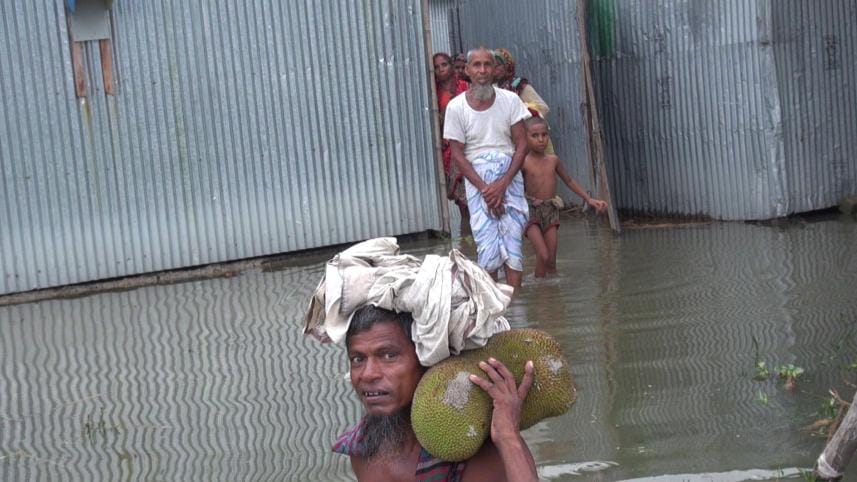Teesta water crosses danger level in Lalmonirhat: 40k people stranded

Around 40,000 people from 65 villages under 15 unions of Lalmonirhat district are caught in water as the low-lying char areas of Teesta and Dharla river basin areas are flooded for a rush of water from upstream India this morning.
The water level of the River Teesta was flowing 22 centimetres above the danger mark of 52.60 metres at Teesta Barrage point of Dowani area in Hatibandha upazila this morning, said Muhibul Islam, sub divisional engineer of Bangladesh Water Development Board (WDB) in Lalmonirhat.
The Dharla River was flowing only one centimetre below the danger level at Shimulbari point of Lalmonirhat Sadar at the same time, he said.
The water level at Teesta was flowing 26 centimetres below the danger mark on Friday evening but the water level increased suddenly due to an onrush from upstream India.
All 44 gates of Teesta Barrage were kept open since this morning for the heavy flow of water, he added.
People of 65 villages are stuck at the Teesta and Dharla river basin chars and low-lying areas in Hatibandha, Kaliganj, Aditmari, Patgram and Sadar upazilas of Lalmonirhat district.
More people living in the Teesta River basin areas risk facing floods as the water level is rising at an alarming rate.
Mansur Ali, 52, living in Balapara village adjacent to the bank of Teesta River, said their cooking stoves and tube wells are inundated. They are now passing their days by taking jackfruit and dried food such as -- chira and muri.
They returned home on Thursday after being stranded on government roads for five days due to the floodwaters. His family is worried now as the water level of Teesta is rising again after two days.
Sexagenarian Monowar Hossain of Char Narsingh of Teesta River area said they returned home two days back and now they have to run to a safe place again.
Afina Bewa, a 54 year old widow from Harinchara char under sadar upazila, said her seven-member family and the other villagers are stuck in knee-deep waters.
"Some villagers moved to safer places. But many of us could not, leaving our valuables behind," she added.



 For all latest news, follow The Daily Star's Google News channel.
For all latest news, follow The Daily Star's Google News channel.
Comments